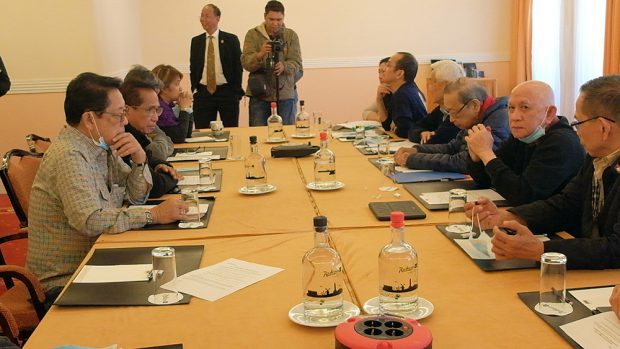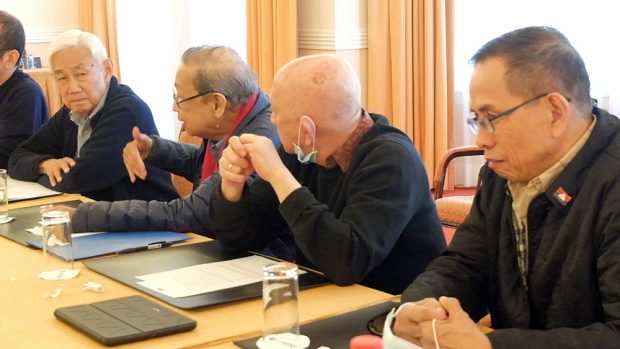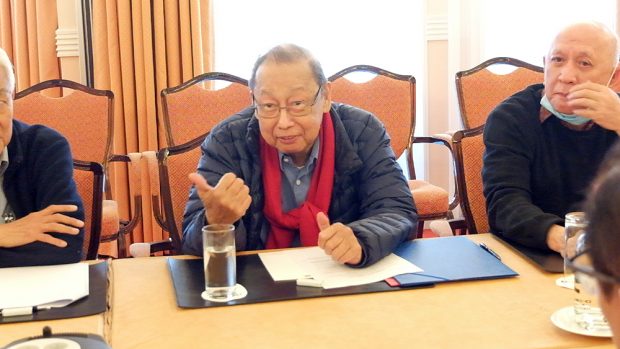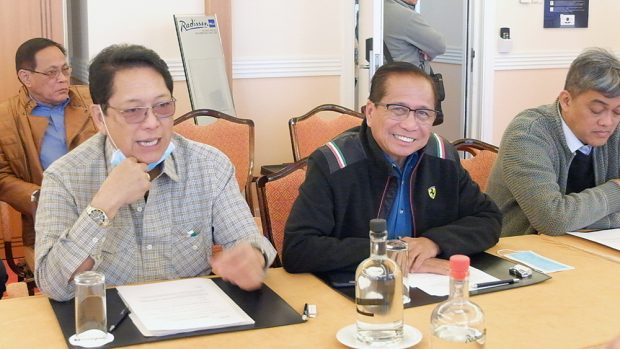Fourth round of GRP-NDFP talks finally opens; ceasefire in the agenda
NOORDWIJK, The Netherlands—The opening ceremony of the fourth round of formal talks between the Government of the Republic of the Philippines (GRP) and the National Democratic Front of the Philippines (NDFP) pushed through this morning, both parties making yet another unprecedented move towards achieving more substantial agreements despite tensed negotiations the previous day.
With nearly all the negotiators, consultants, advisers and resource persons of both parties wearing traditional barong Tagalog and ternos, the ceremony regained some of the light-heartedness of the previous three rounds seemingly lost in the frantic informal discussions marking the first day of negotiations.
Delayed by only a few minutes, the ceremony went as planned and was marked with congratulatory remarks at NDFP Chief Political Consultant Jose Maria Sison’s recovery from a month-long hospitalization.
Deviating from his prepared speech, Sison thanked the Royal Norwegian Government for agreeing to facilitate the talks in The Netherlands to allow his participation in this round of talks.
Norwegian Special Envoy to the Philippine Peace Process Elisabeth Slattum congratulated the GRP and NDFP panels for showing “flexibility” and “creativity” to move the talks forward, as well as on “seek(ing) solutions when others would just give up.”
“I would like to congratulate the parties and the President of the Philippines for working through a tough crisis and for showing courage, perseverance and genuine commitment for the achievement of peace for the benefit of the Filipino people,” Slattum said.
“This is the farthest point that we have already achieved in our negotiations with the Communist Party of the Philippines, New People’s Army and the National Democratic Front. We are on our fourth round of talks,” President Peace Adviser on the Peace Process Jesus Dureza said.
“I am seeing and noticing that we that we are no longer in the concept of negotiating but already sharing common values and common aspirations for a better Philippines,” he said.
“The NDFP Negotiating Panel comes to this fourth round of formal talks determined as ever to push and accelerate the negotiations in the hopes of forging a comprehensive agreement on social and economic reforms by the end of 2017,” Fidel Agcaoili, the Left’s chief negotiator, for his part, said.
Just a means to an end
Agcaoili, however, reiterated in his opening statement the NDFP’s stand on the bilateral ceasefire proposal after GRP President Rodrigo Duterte insisted on a signed agreement in this round of talks.
“I share Professor Sison’s positive views and reiterate the wisdom of securing the approval of the CASER (Comprehensive Agreement on Socio-Economic Reforms) ahead of any bilateral ceasefire agreement, unless both agreements can be signed simultaneously. It is important to stress this as the issue of ceasefire should not be pursued as an end in itself,” Agcaoili said.
“Ceasefires, whether unilateral or bilateral, are just a means to an end. Its main purpose is to create conditions conducive to reaching agreements on basic re- forms that are satisfactory to both sides,” Agcaoili added.
The opening ceremony was postponed by a day after the GRP informed the NDFP of Duterte’s new “basest conditionalities” that include a signed bilateral ceasefire agreement.
In response, Agcaoili mentioned a memorandum of understanding that may break the impasse on the issue of the bilateral ceasefire agreement.
“The NDFP believes it is possible to have a bilateral ceasefire agreement that conforms to the position that simultaneous and reciprocal declarations of unilateral ceasefire can be agreed upon and bound by a Memorandum of Understanding that shall be issued at the end of the fourth round of formal talks,” Agcaoili said in his speech.
Both parties said the remaining four days of the round would be spent on the continuation of the discussions on the proposed bilateral ceasefire agreement, the Comprehensive Agreement on Human Rights and International Humanitarian Law in respect to the release of all political prisoners, and the implementation of socio-economic projects for the Filipino people. # (Raymund B. Villanueva)












































